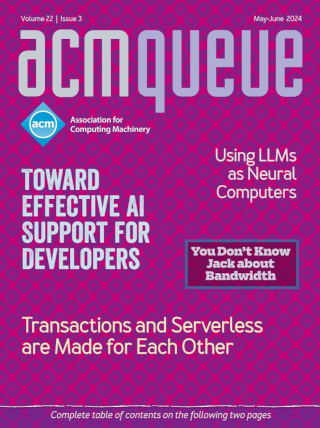Mobile Devices in the Enterprise: CTO Roundtable Overview:
An overview of the key points discussed in the ACM Roundtable on Mobile Devices in the Enterprise
The CTO Roundtable on Mobile Devices in the Enterprise focuses on the implications of the widespread use of mobile devices, such as smartphones, in the enterprise computing environment. These new personal devices have presented great challenges and opportunities for the protection of valuable information assets and creation of business value. What follows are the key points from that broader conversation.
ACM CTO Roundtable on Mobile Devices in the Enterprise:
Finding solutions as growth and fragmentation complicate mobile device support
BlackBerry? iPhone? Android? Other? Thin client or fat client? Browser or Wi-Fi? Developers of mobile applications have many variables to consider in a rapidly changing environment. The mobile device market is growing quickly and fragmenting as it does so. Supporting mobile devices in the enterprise is getting much more complicated because of both this rapid growth worldwide and the diverse set of devices and networks.
Mobile Application Development: Web vs. Native:
Web apps are cheaper to develop and deploy than native apps, but can they match the native user experience?
A few short years ago, most mobile devices were, for want of a better word, "dumb." Sure, there were some early smartphones, but they were either entirely e-mail focused or lacked sophisticated touch screens that could be used without a stylus. Even fewer shipped with a decent mobile browser capable of displaying anything more than simple text, links, and maybe an image. This meant if you had one of these devices, you were either a businessperson addicted to e-mail or an alpha geek hoping that this would be the year of the smartphone.
Like a Podcast in the Sea: Mean ol’ LoTech Blues:
Is it just a matter of semantics?
Mache Creeger’s general pessimism about IT’s status quo rests on his perception that HiTech (the character- and tree-saving token for High Technology, somewhat, if not totally, vitiated by this long-winded, unnecessary explanation) is not quite Hi enough. IT relies too much on dreary, evolutionary gradualism rather than on the exciting Kuhnian discontinuities that spell revolution and paradigm shifts. I have no qualms about Creeger’s observation that the marketeers, both commercial and academic (if such categories can be distinguished in these pursy PC times), are fond of paint jobs - coloring the most modest upgrades with claims of major, must-have breakthroughs. This is an ancient and, alas, effective promotional ploy in other trades.
Java in a Teacup:
Programming Bluetooth-enabled devices using J2ME
Few technology sectors evolve as fast as the wireless industry. As the market and devices mature, the need (and potential) for mobile applications grows. More and more mobile devices are delivered with the Java platform installed, enabling a large base of Java programmers to try their hand at embedded programming. Unfortunately, not all Java mobile devices are created equal, presenting many challenges to the new J2ME (Java 2 Platform, Micro Edition) programmer. Using a sample game application, this article illustrates some of the challenges associated with J2ME and Bluetooth programming.
Streams and Standards: Delivering Mobile Video:
The era of video served up to mobile phones has arrived and threatens to be the next “killer app” after wireless calling itself.
Don’t believe me? Follow along… Mobile phones are everywhere. Everybody has one. Think about the last time you were on an airplane and the flight was delayed on the ground. Immediately after the dreaded announcement, you heard everyone reach for their phones and start dialing.
Mobile Media: Making It a Reality:
Two prototype apps reveal the challenges in delivering mobile media services.
Many future mobile applications are predicated on the existence of rich, interactive media services. The promise and challenge of such services is to provide applications under the most hostile conditions - and at low cost to a user community that has high expectations. Context-aware services require information about who, where, when, and what a user is doing and must be delivered in a timely manner with minimum latency. This article reveals some of the current state-of-the-art "magic" and the research challenges.
Enterprise-Grade Wireless:
Wireless technology has come a long way, but is it robust enough for today’s enterprise?
We have been working in the wireless space in one form or another in excess of 10 years and have participated in every phase of its maturation process. We saw wireless progress from a toy technology before the dot-com boom, to something truly promising during the boom, only to be left wanting after the bubble when the technology was found to be not ready for prime time. Fortunately, it appears that we have finally reached the point where the technology and the enterprise’s expectations have finally converged.
A Conversation with Teresa Meng:
The founder of Atheros analyzes the role of signal processing in the evolving world of wireless communications.
In 1999, Teresa Meng took a leave of absence from Stanford University and with colleagues from Stanford and the University of California, Berkeley, founded Atheros Communications to develop and deliver the core technology for wireless communication systems. Using a combination of signal processing and CMOS RF technology, Atheros came up with a pioneering 5 GHz wireless LAN chipset found in most 802.11a/b/g products, and continues to extend its market as wireless communications evolve.
Wireless Networking Considered Flaky:
You know what bugs me about wireless networking? Everyone thinks it’s so cool and never talks about the bad side of things.
Oh sure, I can get on the ’net from anywhere at Usenix or the IETF, but those are _hostile_ _nets_. Hell, all wireless nets are hostile. By their very nature, you don’t know who’s sharing the ether with you. But people go on doing their stuff, confident that they are OK because they’re behind the firewall.
Open Spectrum:
A Path to Ubiquitous Connectivity
Just as open standards and open software rocked the networking and computing industry, open spectrum is poised to be a disruptive force in the use of radio spectrum for communications. At the same time, open spectrum will be a major element that helps continue the Internet’s march to integrate and facilitate all electronic communications with open standards and commodity hardware.
Designing Portable Collaborative Networks:
A middleware solution to keep pace with the ever-changing ways in which mobile workers collaborate.
Peer-to-peer technology and wireless networking offer great potential for working together away from the desk - but they also introduce unique software and infrastructure challenges. The traditional idea of the work environment is anchored to a central location - the desk and office - where the resources needed for the job are located.
The Family Dynamics of 802.11:
The 802.11 family of standards is helping to move wireless LANs into promising new territory.
Three trends are driving the rapid growth of wireless LAN (WLAN): The increased use of laptops and personal digital assistants (PDAs); rapid advances in WLAN data rates (from 2 megabits per second to 108 Mbps in the past four years); and precipitous drops in WLAN prices (currently under $50 for a client and under $100 for an access point).






